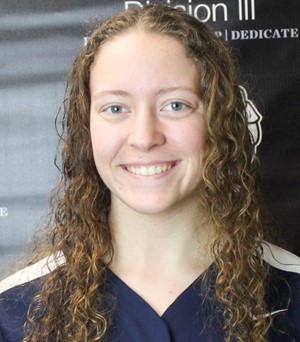By Jordan Walter ’24 staff writer
Imagine the world being flipped on its side. Lindsey McCurdy experiences this multiple times a week as her vision shifts 90 degrees.
McCurdy, a sophomore softball player, got her fifth diagnosed concussion earlier this semester, resulting in traumatic side effects.
While practicing softball, McCurdy got hit in the forehead by a pitch while batting. Eight days later, McCurdy received a second impact when she accidentally hit her head on a cement wall. Eight days after that, she was diagnosed with a concussion and began treatment.
For treatment, McCurdy has altered her diet and sleep schedule, making sure she is hydrated and well-nourished. She also visits the athletic trainer’s office where she does light exercises until her symptoms decrease.
Like typical concussions, McCurdy experiences painful headaches, brain fog and sensitivity to light and sound. What makes this concussion unique is that McCurdy’s vision shifts.
“My vision does a flip of 90 degrees,” McCurdy said. “And I feel that I am floating parallel to the ground.”
These instances usually last around a minute and occur several times a week.
McCurdy also explains that she has experienced even more severe occurrences, losing both her sight and hearing. This happened after throwing with an athletic trainer.
“I got the feeling that my vision was going to flip,” McCurdy said. “So, we stopped throwing and went back to the trainer’s room. I was sitting down and I went blind and deaf for around a minute.”
McCurdy explains that for the rest of the day she felt nauseous and uneasy.
With the help of the resources on campus, the athletic health team has constructed a plan to help McCurdy heal from her concussion.
The first step to help McCurdy feel better is to practice vestibular ocular therapy, which focuses on eye movement and tracking.
If that doesn’t help, the next step is to see a physical therapist who can adjust the crystals in McCurdy’s ears to help restore her equilibrium and balance.
The last resort is to send McCurdy for treatment at Penn State Health where it’s possible that the doctors would conduct a case study about her to figure out why and how her vision flips.
At this time, it has been nine weeks since McCurdy was diagnosed. She states that the only improvement of her symptoms has been in her sleep patterns.
McCurdy hopes that with the help of these new treatments, she will start to feel better again.
